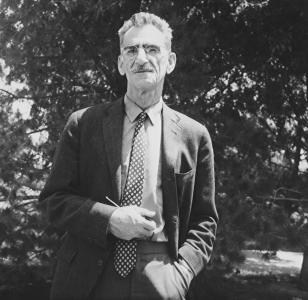Summary | Excerpt | Reviews | Beyond the Book | Read-Alikes | Genres & Themes | Author Bio

A Novel
by Garth GreenwellThis article relates to Small Rain
 In Garth Greenwell's novel Small Rain, the unnamed protagonist—facing a difficult and uncertain medical diagnosis—finds solace in a poem by the poet George Oppen. The poem is only a few simple lines, but the protagonist marvels at how much unfolds when one sits with Oppen's work and lets it quietly speak. "I loved how, among the abstraction, his images became luminous, shards of the real, non-abstract world, occasions for wonder," he thinks.
In Garth Greenwell's novel Small Rain, the unnamed protagonist—facing a difficult and uncertain medical diagnosis—finds solace in a poem by the poet George Oppen. The poem is only a few simple lines, but the protagonist marvels at how much unfolds when one sits with Oppen's work and lets it quietly speak. "I loved how, among the abstraction, his images became luminous, shards of the real, non-abstract world, occasions for wonder," he thinks.
Even for poetry lovers, the name George Oppen may be unfamiliar. However, he is a fascinating and significant figure in twentieth century American poetry.
Born in 1908 to an affluent New York family, Oppen lost his mother to suicide when he was only four years old. His father soon remarried, but he had a difficult relationship with his stepmother, and his childhood spent in New York and San Francisco was not a happy one. After tumultuous teenage years, Oppen met his wife, Mary Colby, at college in Oregon. The two eventually began a long road trip across the country, where they worked any jobs that they could find, and Oppen wrote poetry.
When George and Mary reached New York, he became involved with a group of poets creating a new movement they called Objectivism. The idea was to emphasize "simplicity and clarity over formal structure and rhyme." Oppen came into a small inheritance when he turned twenty-one, and together with the poet Louis Zukofsky, he started a short-lived poetry magazine that published work by William Carlos Williams and Ezra Pound, among others. Later, he would be a cofounder of the Objectivist Press, which would publish numerous books of poetry, including Oppen's own first book, Discrete Series, with a preface by Ezra Pound.
During the Great Depression, the Oppens became increasingly interested in progressive politics and activism. George would stop writing poetry entirely, finding it inadequate to address the demands of the times; in his essay "The Mind's Own Place," he argues that poetry is not a form of political action. "There are situations which cannot honorably be met by art, and surely no one need fiddle precisely at the moment that the house next door is burning," he wrote. He began working for the American Communist Party in various roles, including serving as an election campaign manager in 1936. However, by 1942, the Oppens were disillusioned with the Party, and George quit his job to join the military, believing that the World War II fight against fascism was paramount. After being badly wounded in battle, he was awarded a Purple Heart.
Soon after returning to New York after the war, George and Mary were targeted by the House of Un-American Activities Committee led by Senator Joseph McCarthy. They fled to Mexico, where they lived for most of the next decade. When they returned to New York in the late 1950s, Oppen began writing poetry again. He published several more books of poetry, and was awarded the Pulitzer Prize in 1969 for Of Being Numerous, his most critically acclaimed collection; the title poem is "widely considered his masterpiece" and "examines questions of singularity within a diverse and crowded world."
Oppen's poetry is spare and precise, with "terse, powerful lines and strong, focused syntax." Like other Objectivist poets, he "emphasized the poem as an object in itself, not as a vehicle of meaning or association." The poet James Longenbach wrote that "Oppen's respect for the art of making, no matter how small, is at every moment palpable, and it infuses his work with sweetness that makes difficulty feel like life's reward."
George and Mary moved back to San Francisco in the late 1960s. His final work, Primitive, was completed with Mary's help in 1978, after he became stricken with Alzheimer's disease; Mary also published an autobiography, Meaning a Life, that year.
Filed under Books and Authors
![]() This "beyond the book article" relates to Small Rain. It originally ran in September 2024 and has been updated for the
September 2024 edition.
Go to magazine.
This "beyond the book article" relates to Small Rain. It originally ran in September 2024 and has been updated for the
September 2024 edition.
Go to magazine.
Your guide toexceptional books
BookBrowse seeks out and recommends the best in contemporary fiction and nonfiction—books that not only engage and entertain but also deepen our understanding of ourselves and the world around us.